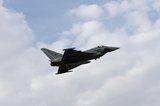France, Germany break impasse on arms exports
France and Germany agreed on 16 October on an accord governing the export of jointly developed weapons and defence equipment, removing a key stumbling block to their development of next-generation tanks and fighter jets.
‘We have finalised a major, legally binding deal on arms exports to fully complete these programmes,’ French President Emmanuel Macron said at a press conference with German Chancellor Angela Merkel.
The two leaders met in the southwest French city of Toulouse, home of Airbus, as well as a major factory owned by Dassault Aviation.
Both companies areworking on the ambitious FCAS project (pictured), which will combine a new fighter plane with drones, satellites and other aircraft to help reduce the EU's long reliance on US planes and equipment.
But Paris and Berlin have not always seen eye-to-eye on weapons sales beyond the EU – and both countries say such exports are crucial for making the new plane and tank projects viable.
France, for example, has maintained its arms sales to Saudi Arabia, while Germany has halted them over the killing of Saudi journalist Jamal Khashoggi.
Currently, either country could halt the export of jointly made weapons in case of disagreement on the buyer, a complexity removed by the Franco-German deal, French officials said.
‘It marks the mutual confidence between France and Germany and constitutes the basis of success for common projects like the tank and the future aircraft,’ as well as scores of other joint projects, a French presidency official told AFP.
More from Defence Notes
-
![Why small guns have been critical to layered CUAS architectures]()
Why small guns have been critical to layered CUAS architectures
Multiple countries have been deploying small arms as the last line of drone defence due to their multiple operational and tactical advantages.
-
![Singapore Airshow 2026: ST Engineering hints at export success for AME assault rifle family]()
Singapore Airshow 2026: ST Engineering hints at export success for AME assault rifle family
The Singapore-based technology company unveiled its new rifle family at this week’s airshow. Chen Chuanren spoke with the ST Engineering’s head of small arms to find out more about how the weapons have been refined.
-
![High tension in the High North – a wake-up call for NATO’s future Arctic defence efforts?]()
High tension in the High North – a wake-up call for NATO’s future Arctic defence efforts?
Any potential ‘Arctic Sentry’ mission would be months in the planning, but with tensions high in the region given the US’s push for Greenland, NATO countries will need to continue to emphasise their commitment to the region, analysts have said.
-
![Venezuela prepares personnel and equipment for a potential second US attack]()
Venezuela prepares personnel and equipment for a potential second US attack
Defence Minister Gen Vladimir Padrino López has declared that the Venezuelan armed forces “will continue to employ all its available capabilities for military defence”.
-
![As the new year starts, the UK defence spending delay continues]()
As the new year starts, the UK defence spending delay continues
The UK’s defence spending commitments remain uncertain as the government’s Defence Investment Plan, which had been due by the end of 2025, is yet to be published.
-
![How might European countries look to tackle drone incursions?]()
How might European countries look to tackle drone incursions?
Disruption of infrastructure in Europe, whether by cyberattack, physical damage to pipelines or uncrewed aerial vehicles flying over major airports, as has happened more recently, is on the rise. What is the most effective way of countering the aerial aspect of this not-so-open warfare?
























